Migrant showdown in Chicago: Two residents set to face judge as they SUE city officials to stop them from housing migrants in public schools, parks and police stations
Two Chicago residents will appear in court Monday after suing the city to stop the use of public spaces like parks and police stations to house migrants.
South Shore activists Natasha Dunn, Jimmy Darnell Jones and others filed the lawsuit in September against the city, Democratic Mayor Brandon Johnson and Chicago public schools.
Prosecutors argue that using public buildings to house migrants is a nuisance to the community and accuse officials of violating codes as they desperately look for space to house asylum seekers.
If the lawsuit is successful, Mayor Johnson would be unable to disrupt park programs and violate zoning laws, and would have to fully disclose how much money the city spends on migrants. Johnson has previously estimated that Chicago will spend about $255 million on the migrant crisis by 2023.
More than 24,000 migrants have arrived in the Windy City since Texas Governor Greg Abbot began sending buses last year in an effort to highlight what he calls Democrats’ open-borders policy. Chicago state officials said about 700 new migrants are arriving each week.
South Shore activists Natasha Dunn (right) and Jimmy Darnell Jones filed the lawsuit in September
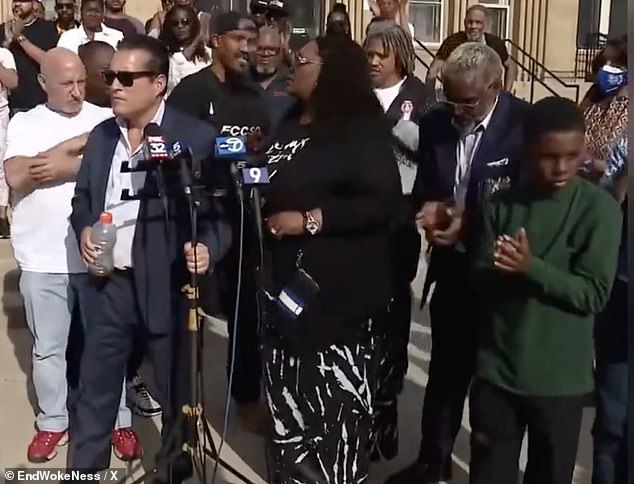
If the lawsuit is successful, Mayor Johnson would not be able to disrupt park programs and violate zoning laws
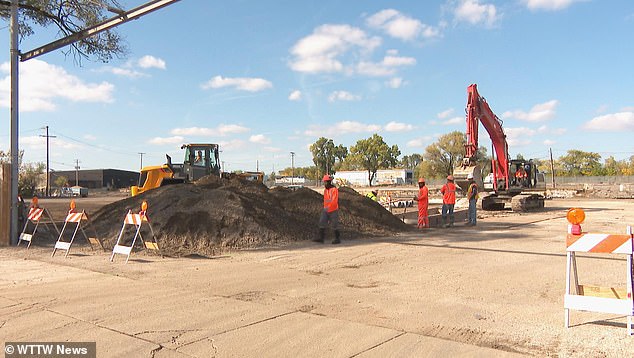
A wasteland is about to be turned into a migrant camp, despite vocal opposition from locals
The city has used commercial space, hotels and field houses in the park district as shelters once migrants have been moved from police stations and O’Hare International Airport.
As space becomes scarcer, officials are working on future campsites for migrants, including a “winterized” campsite on a vacant lot in Brighton Park; The proposed camp has sparked several protests from residents of the area, who say they do not want the site to be disturbed. They also say the soil is contaminated with toxic metals.
Dunn and Jones also filed a lawsuit in May to stop the city from converting the former South Shore High School into a migrant shelter. That lawsuit was dropped and the city never converted the school into housing for asylum seekers, despite a city contract to do so.
Earlier this month, Governor JB Pritzker announced Thursday that Illinois will provide an additional $160 million to help migrants arriving in Chicago resettle, including $65 million to help the city launch a “winterized” temporary shelter to prevent that people sleep outside in cold weather.
Illinois has already spent or committed more than $638 million to address the humanitarian asylum seeker crisis. The additional resources will come from the Illinois Department of Human Services. Chicago is responsible for housing newcomers and has also spent hundreds of millions of dollars housing them.
Of the state’s $160 million in new investments, $30 million will go toward establishing an intake and welcome center to serve those coming to Chicago who already have a place to stay with friends or family, or who plan to continue to another place, better help. location, the governor said.
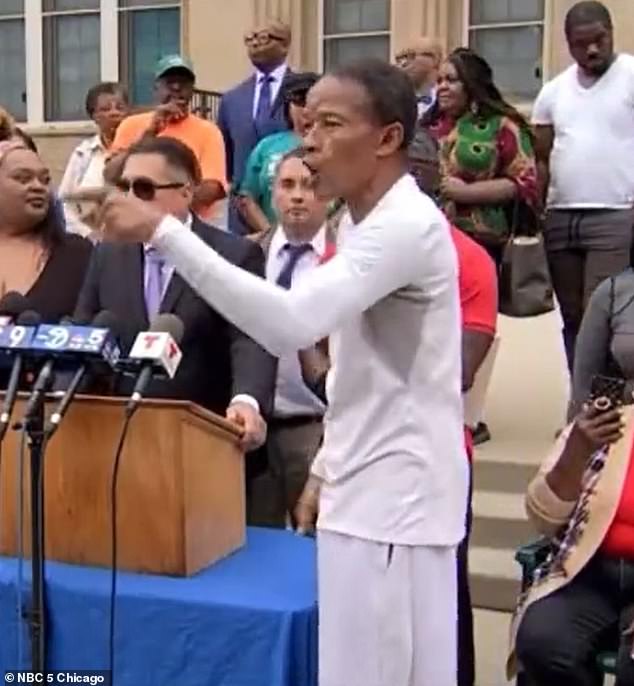
An angry local called Mayor Brandon Johnson and the Democrats “criminals” for their handling of the situation as residents gathered to discuss a lawsuit against the city
Another $65 million will go toward helping Chicago set up a “winterized soft shelter” that will provide temporary housing for up to 2,000 people. State officials did not immediately respond to a request for clarification on whether this refers to tents or physical shelters.
And another $65 million will provide services such as rental assistance and help with paperwork, including work permits. The idea is to let people live independently as quickly as possible.
Pritzker said the state has now stepped in because the city is moving too slowly. Chicago has come under scrutiny from immigrant rights groups, local leaders and residents for its handling of the crisis, which relied heavily on volunteers.
‘The city uses its own methodological process. And it’s not happening fast enough,” Pritzker said at a news conference at a statehouse in Chicago. “We are intervening here to help and speed up this process.”
Mayor Brandon Johnson, who took office in May, has called it an inherited problem and the city is working to address it. Earlier this week, he announced new limits on how long migrants can stay in city-run shelters and said more resources would come from the state and county.
About 2,500 men, women and children are awaiting placement in city-run shelters and sleeping inside or outside police stations or at O’Hare International Airport, the city said.
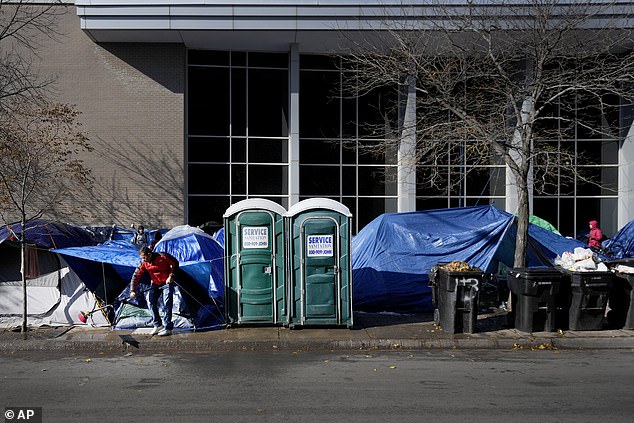
A migrant sweeps the sidewalk in a small tent community in Chicago
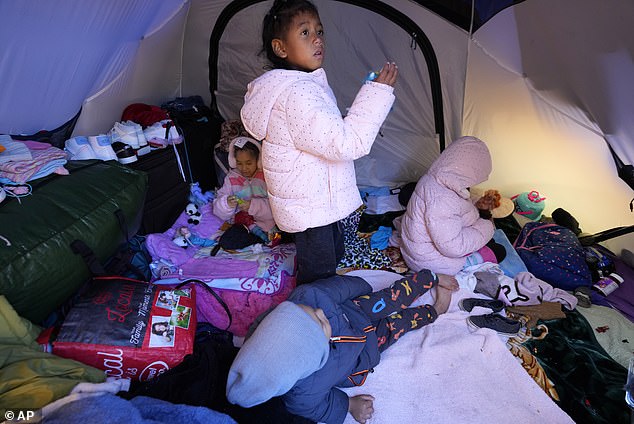
Johnson estimates that Chicago will spend about $255 million on the migrant crisis in 2023
Johnson announced plans to limit stays in the shelter to 60 days. He did not provide details on what would happen if people did not have more permanent housing available within that time frame.
Meanwhile, tensions between Chicago’s black and Hispanic communities have reached a boiling point as the city’s African American community denounces the use of public resources to help migrants.
Democratic Socialist councilor Carlos Ramirez-Rosa was forced to resign as president of the city council after he was accused of ‘bullying’ a colleague and preventing her from attending a vote on a sanctuary status referendum in the city.
Lawmakers attended a vote on whether Chicago would put sanctuary city status on the ballot next year.
The city’s sanctuary status has been in place since 1985 and helps “ensure that undocumented residents are not prosecuted solely because of their immigration status.”
Ramirez-Rosa was tasked with rallying support for the mayor to reverse the referendum challenge and reportedly tried to prevent the measure’s supporters from getting a quorum to vote on the proposal.
The Chicago Black Caucus said the incident was “an unfortunate and direct reminder of the decades of challenges that African American women serving on City Council have had to overcome in our collective efforts to increase the upward mobility of our collective communities.” ‘
Cities like New York and Denver also no longer have room to accommodate the flow of migrants coming from the US-Mexico border as winter approaches.
NYC has already begun housing migrants in tent facilities at airports and soccer fields, forcing Mayor Eric Adams to cut millions of dollars in city services and warning that migrants could be sheltered in parks in the future.
